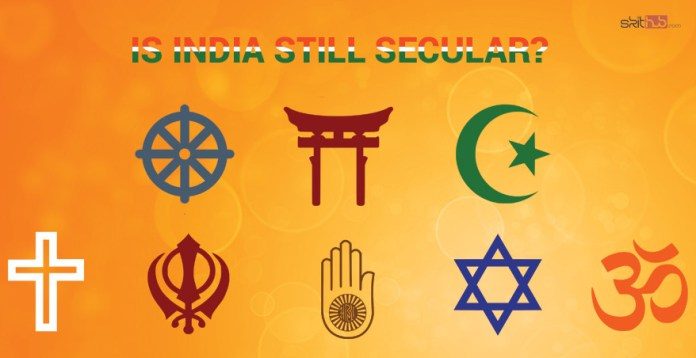This article is written by Divyanshi Singh of Symbiosis Law School, Noida. This article aims at explaining what secularism is, its legality, and its relevance in India.
Table of Contents
Introduction
“WE, THE PEOPLE OF INDIA, having solemnly resolved to constitute India into a [SOVEREIGN, SOCIALIST SECULAR DEMOCRATIC REPUBLIC]…”
These words mark the beginning of the world’s lengthiest Constitution, officially known as the Constitution of India. The Constitution was enacted on the 26th of January 1950. At that particular time, the word “secular” was not present in the Preamble. It was only in 1976, that the word “secular” was added along with several other additions through the 42nd Constitutional Amendment Act.
Meaning
Secularism in the true sense is a belief system that separates religion from state and its civic affairs. The word ‘secularism’ originated in late medieval Europe. The introduction of the word “secular” by the 42nd amendment simply made the secular nation of the Indian Constitution more apparent. No religion is given special status in India as a state. There is no such thing as an Indian state religion. This distinguishes it from theocratic regimes such as the Islamic Republic of Pakistan and other Islamic countries. Secularism is a fundamental principle of the Indian Constitution’s basic structure.
Positively, India advocates secularism by granting equal religious freedom to all religions. It stands for all citizens’ right to freedom. Explaining the meaning of secularism as adopted by India, Alexandrowics writes, “India as a secular state guarantees constitutionally, freedom of religion to all persons and does not assign a special position to any particular religion.”
Constitutional aspect
We can see the traces of secularism in several Articles of the Indian Constitution. Let us elaborate upon each of them.
Article 14
Article 14 ensures that every person is equal before the law. All persons are equal in the eyes of law. There are two main rights:
- Equal legal protection to all persons.
- Equal subjugation of all people to the laws of the land.
Article 15
According to Article 15, a person who is a citizen of India cannot be discriminated against based on religion, race, caste, sex, or place of birth. It ensures that a person cannot be denied access to shops, public restaurants, hotels, wells, roads, etc.
Article 16
All the citizens of India have equality of opportunities in employment. Article 16 ensures that no person is ineligible for employment based on religion, race, caste, sex, or place of birth.
Article 19
Article 19 guarantees six important fundamental rights to the citizens of India along with some reasonable restrictions. These are basic rights and liberties which are recognized as the natural rights inherent in the status of a citizen and are preconditions for a democratic state based on the rule of law. These liberties include freedom of speech and expression, peaceful assembly, forming associations, moving freely in the country, residing in any part of the country, and lastly to carry on the profession of one’s choice. Since, complete freedom is bound to get an anarchic rule in the country, also known as jungle rule, therefore, these freedoms are restricted.
Article 25
Article 25 ensures that all persons get the freedom of conscience and the right to profess, practice, and propagate any religion of their choice. Religious conversion cannot be done forcefully as it is a punishable offence. Due to the secular features of India, no single state gets the title of state religion in India. All religions are treated equally in the eyes of law. People are vested with religious freedom and can adopt or refrain from adopting any religion.
Article 26
Article 26 guarantees the rights of religious denominations or their sections. It protects collective freedom of religion. It is also subject to public order, morality, and health but not subject to other provisions relating to fundamental rights. The Supreme Court of India has held multiple times that the religious denomination must assure three constraints which are as follows:
- A group of individuals should believe in an ideology that they consider to be conducive to their spiritual well-being.
- It should have a common organization.
- There should be a unique name designated to it.
Article 27
The Constitution states in Article 27 that no one shall be compelled to pay any taxes, of which the proceeds are specifically designated for the promotion or maintenance of any particular religious denomination.
Article 28
Article 28 forbids the teaching of religion in any educational institution that is entirely supported by out-of-state finances or receives it from the state. This condition, however, does not apply to any educational institution managed by the state but formed under any endowment or trust that requires religious instruction to be delivered in such an institution. No one attending an educational institution may be coerced to engage in any religious service that may be held on the premises.
Article 44
Article 44 deals with Uniform Civil Code. It aims at administering people with the same set of secular civil laws irrespective of their religion, caste, and tribe. This code is based on the constitutional obligation to ensure justice and equality for all citizens. A uniform criminal code applies to all citizens, regardless of religion, caste, gender, or place of residence in our country. However, a corresponding code covering marriage, divorce, succession, and other family concerns has not been implemented in India yet.
Implications of secularism in light of notable case laws in recent times
Kesavananda Bharati v. State of Kerala
In 1973, in the Kesavananda Bharati v. State of Kerala judgment, the Supreme Court of India held that secularism is a part of the basic structure of the Constitution. Further, it was held that elements that constitute the basic structure cannot be amended by the Parliament.
S.R Bommai v. Union of India
The principle laid down in the Kesavananda Bharati case was reiterated in 1994 in the case of S.R Bommai v. Union of India. The Supreme Court cleared the doubt over the word ‘secularism’ in the Constitution. The Court held that a secular nature of a society does not make it an atheist society. Secularism makes society more heterogeneous. The law of a secular nation provides equal status to all religions and does not favour or discriminate against anyone.
Ahmedabad St. Xavier’s College v. State of Gujarat
In the landmark case of Ahmedabad St. Xavier’s College v. State of Gujarat, the Supreme Court held that secularism neither means anti-God nor pro-God. It ensures that nobody shall be discriminated against based on religion. Secularism, therefore, eliminates the concept of God in matters of the state.
Stainislaus Rev v. State of MP
The High Court of Madhya Pradesh, in Stainislaus Rev v. State of MP, explained that freedom of ‘profession’ means one’s right to state in public the creed he belongs to. Moreover, the Court said that freedom of ‘practice’ means one’s right to worship in private or public. It was further explained that the right to propagate one’s religion gives one the right to convey his/her religious beliefs to another individual but not to convert a person to one’s religion.
Indian Young Lawyers Association v. State of Kerala
In the case of Indian Young Lawyers Association v. State of Kerala, it was held that preventing the women in their “menstruating years” from entering the Sabarimala temple as per the religious custom, violates women’s constitutionally protected fundamental rights to equality. The dissent of Justice Indu Malhotra has raised doubts regarding the extent to which established religious practices can be challenged based on equality.
The relevance of secularism in India
Religious plurality in India makes secularism very important to be present in India. India needs to resort to pluralism to keep itself integrated. Secularism as an ideology tries to keep the nation united on non-religious fronts like financial development, better education, etc. These move the focus of individuals from religion to other important things that could change the present for a better and brighter future.
Presently, the development of Hindutva as a significant counter-ideology has functioned as a trigger for the intensification of the secularism discussion in India. Hindutva ideology, often known as religious nationalism or Hindu nationalism, is a nationalist ideology that is critical of the kind of secular philosophy that governs the Indian Constitution.
The debate over the adoption of a Uniform Civil Code is exemplified by the contradiction between two constitutional rights. On one hand, the right to equality and non-discrimination is guaranteed under Articles 14 and Article 15, and on the other hand, religious freedom and cultural plurality are guaranteed under Articles 25 and Article 28.
Enacting a Uniform Civil Code (Article 44) is only a directive principle of state policy and is not binding on the state. However, equality and multiculturalism are the rights given to the citizens and are justiciable. It is within Article 44 of the Constitution that one needs to study the statements by the Supreme Court that suggest the enactment of a Uniform Civil Code.
Scope of improvement
In India, the term societal morality has now been renamed Constitutional Morality. However, this term is not mentioned in the Constitution. The term ‘Constitutional Morality’ was coined by the judiciary to give itself undue power. The doctrine of basic structure gives the judiciary the power to interpret the constitution and make decisions on it.
If all of the previous cases involving constitutional morality are examined, it may be deduced that it is an attempt to adapt the country to current norms, giving priority to ‘living with dignity’ under Article 21. Whether it is criminalizing Section 377 of the Indian Penal Code or the Sabarimala judgment overturning the traditional practices of not letting women in the menstruating age enter the temple, constitutional morality is attempting to uplift society. The truth remains that the Supreme Court has enormous discretion in resolving cases. “Power corrupts, and absolute power corrupts absolutely,” it is said. It will be interesting to see how the court will use the power granted to it by the Constitutional Morality Clause.
We can undoubtedly discuss the degree to which the government intervenes in religious concerns and if this violates constitutional safeguards. We can also debate whether enacting a Uniform Civil Code would be consistent with Indian secularism. But a diverse, plural society like India cannot thrive unless it adheres to the unique form of secularism enshrined by our forefathers.
Conclusion
India is one of the 96 secular nations that provides equal protection to all religions. It encourages and assists its citizens in adhering to a religion and its practices. However, there are instances when it is necessary to intervene and implement beneficial reforms for the betterment of society. In regards to the recent judgments, a very important question has been raised: Is it important for the court to decide the constitutionality of religious practice to establish a right even when it does not harm the majority section of the society?
A new trend of questioning customs has emerged as a byproduct of modernization. This defines and highlights the right to equality that we have as a fundamental right. Though fighting for your rights is not unethical, intervening in religious matters to establish a right and endangering the religious sentiments of particular followers is not something a secular state should do. Unless there is grave harm that affects a section, the faith and beliefs of the followers should not be hurt.
References
- https://indianexpress.com/article/research/anant-kumar-hegde-secularism-constitution-india-bjp-jawaharlal-nehru-indira-gandhi-5001085/
- https://www.secularism.org.uk/what-is-secularism.html
- https://blog.ipleaders.in/freedom-of-religion-under-the-indian-constitution-2/
- https://www.degruyter.com/document/doi/10.1515/9780822388418-017/html
- https://books.google.co.in/books?hl=en&lr=&id=WHQ2M1lLGVcC&oi=fnd&pg=PP1&dq=secularism+in+india&ots=VBtK-wpmto&sig=wSv6RvHHmR6bG4NfOiLTxf06WZ8&redir_esc=y#v=onepage&q=secularism%20in%20india&f=false
Students of Lawsikho courses regularly produce writing assignments and work on practical exercises as a part of their coursework and develop themselves in real-life practical skills.
LawSikho has created a telegram group for exchanging legal knowledge, referrals, and various opportunities. You can click on this link and join:
https://t.me/joinchat/J_0YrBa4IBSHdpuTfQO_sA
Follow us on Instagram and subscribe to our YouTube channel for more amazing legal content.
 Serato DJ Crack 2025Serato DJ PRO Crack
Serato DJ Crack 2025Serato DJ PRO Crack










 Allow notifications
Allow notifications


